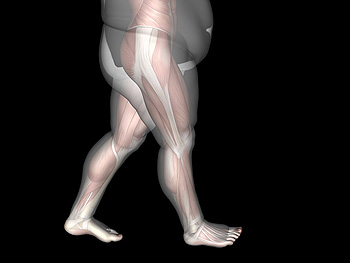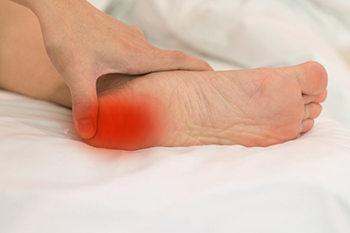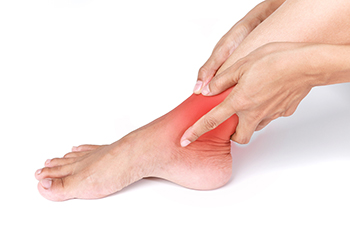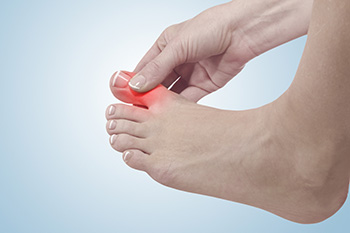Items filtered by date: May 2022
Most Common Sports-Related Foot Injuries

Participating in sports involving running and/or jumping on hard surfaces puts one at more risk for injury than low impact sports, such as golfing or swimming. The truth is that if you participate in any sport, you will likely sustain an injury at some point. The most common foot injuries are plantar fasciitis, neuroma, turf toe, heel spurs, stress fractures, Achilles tendonitis, and tarsal tunnel syndrome. Plantar fasciitis happens when the band of tissue supporting the arch of the foot becomes inflamed or torn. A neuroma is a pinched nerve in the ball of the foot. Turf toe is caused by repeated hypertension of the big toe joint. A heel spur is when the plantar fascia stretches away from the heel and a bony calcium deposit forms on the bottom of the heel bone. A stress fracture is a small crack in the bone and happens when a bone cannot absorb the stress of repetitive impact. Achilles tendonitis is due to overuse, and the large tendon running from the bottom of the foot to the ankle is overstretched. Tarsal tunnel syndrome is when the posterior tibial nerve in the tarsal tunnel becomes compressed. Wearing well-fitted supportive shoes, stretching before sports participation, and not overdoing activity can help prevent such injuries. Resting after an injury before reengaging in the sport is vital. If you feel pain or have endured a sports-related injury, please consult with a podiatrist for a proper diagnosis and treatment plan.
Sports related foot and ankle injuries require proper treatment before players can go back to their regular routines. For more information, contact the foot specialists of Spartan Podiatry. Our doctors can provide the care you need to keep you pain-free and on your feet.
Sports Related Foot and Ankle Injuries
Foot and ankle injuries are a common occurrence when it comes to athletes of any sport. While many athletes dismiss the initial aches and pains, the truth is that ignoring potential foot and ankle injuries can lead to serious problems. As athletes continue to place pressure and strain the area further, a mild injury can turn into something as serious as a rupture and may lead to a permanent disability. There are many factors that contribute to sports related foot and ankle injuries, which include failure to warm up properly, not providing support or wearing bad footwear. Common injuries and conditions athletes face, including:
- Plantar Fasciitis
- Plantar Fasciosis
- Achilles Tendinitis
- Achilles Tendon Rupture
- Ankle Sprains
Sports related injuries are commonly treated using the RICE method. This includes rest, applying ice to the injured area, compression and elevating the ankle. More serious sprains and injuries may require surgery, which could include arthroscopic and reconstructive surgery. Rehabilitation and therapy may also be required in order to get any recovering athlete to become fully functional again. Any unusual aches and pains an athlete sustains must be evaluated by a licensed, reputable medical professional.
If you have any questions please feel free to contact our offices located in Battle Creek, and Marshall, MI . We offer the newest diagnostic and treatment technologies for all your foot and ankle needs.
Plantar Warts Can Be Treated!
The Benefits of Weight Loss on the Feet

Patients who are obese may notice their feet have become larger. This can cause foot pain and the added weight the body endures can wear away at the fat pads on the bottom of the feet. People who have lost a significant amount of weight may find their shoes looser, despite the fact that the foot structure remains the same. The feet can reap the rewards when additional weight is lost. It may help to prevent gout, which is a painful foot condition. foot pain and foot inflammation due to circulatory issues may also improve. Additionally, the risk of getting osteoarthritis may be reduced when weight is lost. Minimal pain in the feet may lead to an increase in performing a frequent exercise, which can add strength to the feet. If you would like more information about how losing weight can benefit the feet please consult with a podiatrist who can answer any questions you may have.
The more you weigh, the harder your feet must work to support your body. If you’re an obese individual and are concerned about your feet, contact the foot specialists from Spartan Podiatry. Our doctors can provide the care you need to keep you pain-free and on your feet.
Obesity and Your Feet
People who are overweight are putting more pressure on their ankles, knees, and hips as well as their feet. This unfortunately can lead to variety of different issues.
Problems & Complications Stemming from Obesity
- When the body is overweight, it tries to compensate by changing the way that it moves. An obese person may lean forward and put extra weight on the wrong part of the foot. This puts unnecessary stress on the feet.
- Obese people are also more likely to develop type II diabetes which is a condition that causes a lot of foot problems. People with diabetes often don’t feel the cuts and sores that they may have on their feet, which can lead to more complicated and severe issues.
- Plantar fasciitis is another foot condition that can be caused by obesity. Plantar fasciitis is an inflammation of the tissue along the bottom of the foot, which causes pain and stiffness while walking and climbing stairs.
If you have any questions, please feel free to contact our offices located in Battle Creek, and Marshall, MI . We offer the newest diagnostic and treatment technologies for all your foot care needs.
No Matter What You Call It, Plantar Fasciitis Hurts

The plantar fascia is a connective band of tissue linking the heel with the toes. Since it is located on the bottom of the foot and is constantly used while standing, walking, running, and jumping, it may become torn, irritated, and swollen from overuse. The medical term for this condition is plantar fasciitis and it is the most common form of heel pain. Pain from plantar fasciitis is usually at its worst first thing in the morning after the plantar fascia has tightened overnight. After walking around and warming the body up, the pain typically subsides only to return later in the day. Because it can be caused by walking, running, and doing repetitive movements, plantar fasciitis has been nicknamed policeman’s heel, runner’s heel, and tennis heel. People who are elderly, obese, or work on their feet all day are more susceptible to acquiring this condition. Additionally, people who have high arches, flat fleet, or certain medical conditions are more at risk. Podiatrists have extensive experience and several effective methods for treating plantar fasciitis because it is so common. If you believe you have this condition, it is advised to make an appointment with a podiatrist who can provide a proper diagnosis, followed by starting correct treatment techniques.
Plantar fasciitis is a common foot condition that is often caused by a strain injury. If you are experiencing heel pain or symptoms of plantar fasciitis, contact the foot specialists from Spartan Podiatry. Our doctors can provide the care you need to keep you pain-free and on your feet.
What Is Plantar Fasciitis?
Plantar fasciitis is one of the most common causes of heel pain. The plantar fascia is a ligament that connects your heel to the front of your foot. When this ligament becomes inflamed, plantar fasciitis is the result. If you have plantar fasciitis you will have a stabbing pain that usually occurs with your first steps in the morning. As the day progresses and you walk around more, this pain will start to disappear, but it will return after long periods of standing or sitting.
What Causes Plantar Fasciitis?
- Excessive running
- Having high arches in your feet
- Other foot issues such as flat feet
- Pregnancy (due to the sudden weight gain)
- Being on your feet very often
There are some risk factors that may make you more likely to develop plantar fasciitis compared to others. The condition most commonly affects adults between the ages of 40 and 60. It also tends to affect people who are obese because the extra pounds result in extra stress being placed on the plantar fascia.
Prevention
- Take good care of your feet – Wear shoes that have good arch support and heel cushioning.
- Maintain a healthy weight
- If you are a runner, alternate running with other sports that won’t cause heel pain
There are a variety of treatment options available for plantar fasciitis along with the pain that accompanies it. Additionally, physical therapy is a very important component in the treatment process. It is important that you meet with your podiatrist to determine which treatment option is best for you.
If you have any questions, please feel free to contact our offices located in Battle Creek, and Marshall, MI . We offer the newest diagnostic and treatment technologies for all your foot care needs.
Testing Your Ankle Health

Most people do not spend a lot of time thinking about the health of their ankles, but this important joint is a workhorse for your body. When you trip but don’t fall, it’s because your ankles have kept you upright. If you need to switch directions in a hurry, it is the ankles that make it possible. One quick way to assess the health of your ankles is by taking a simple test. If you already are experiencing ankle pain, it is best to skip this test and seek out help from a podiatrist as soon as possible. Sit in a straight chair, extend your leg, and turn your ankle clockwise a few times, and then repeat counterclockwise. Try it on the other foot. No pain? That means your ankles are probably doing well. If one ankle is not responding as well as the other one, it may be an indication that something is wrong. Make a note of which part of the ankle hurts, how often the pain occurs, and what you are doing when it starts. This would be a good time to make an appointment with a podiatrist for an examination, diagnosis and possible treatment plan.
Ankle pain can be caused by a number of problems and may be potentially serious. If you have ankle pain, consult with the foot specialists from Spartan Podiatry. Our doctors will assess your condition and provide you with quality foot and ankle treatment.
Ankle pain is any condition that causes pain in the ankle. Due to the fact that the ankle consists of tendons, muscles, bones, and ligaments, ankle pain can come from a number of different conditions.
Causes
The most common causes of ankle pain include:
- Types of arthritis (rheumatoid, osteoarthritis, and gout)
- Ankle sprains
- Broken ankles
- Achilles tendinitis
- Achilles tendon rupture
- Stress fractures
- Bursitis
- Tarsal tunnel syndrome
- Plantar fasciitis
Symptoms
Symptoms of ankle injury vary based upon the condition. Pain may include general pain and discomfort, swelling, aching, redness, bruising, burning or stabbing sensations, and/or loss of sensation.
Diagnosis
Due to the wide variety of potential causes of ankle pain, podiatrists will utilize a number of different methods to properly diagnose ankle pain. This can include asking for personal and family medical histories and of any recent injuries. Further diagnosis may include sensation tests, a physical examination, and potentially x-rays or other imaging tests.
Treatment
Just as the range of causes varies widely, so do treatments. Some more common treatments are rest, ice packs, keeping pressure off the foot, orthotics and braces, medication for inflammation and pain, and surgery.
If you have any questions, please feel free to contact our offices located in Battle Creek, and Marshall, MI . We offer the newest diagnostic and treatment technologies for all your foot care needs.
Gout, Genetics, and Food

Millions of people in the United States are affected by an arthritic condition known as gout. It develops as a result of excess levels of uric acid, which can happen due to genetic reasons or from eating certain foods. The first symptoms are often felt in the joints of the big toe and can cause severe pain and discomfort. The foods to avoid for patients who get frequent gout attacks include red meat, shellfish, excess alcohol, and drinks that are made with large amounts of sugar. It is important to get a proper diagnosis, and this generally happens when uric acid levels are measured via a blood test, or from having an X-ray taken. People who are diabetic or overweight may be more susceptible to developing this condition. It is strongly suggested that patients who suffer from recurring gout be under the medical care of a podiatrist who can diagnose, treat, and manage this painful ailment.
Gout is a painful condition that can be treated. If you are seeking treatment, contact the foot specialists from Spartan Podiatry. Our doctors will treat your foot and ankle needs.
What Is Gout?
Gout is a form of arthritis that is characterized by sudden, severe attacks of pain, redness, and tenderness in the joints. The condition usually affects the joint at the base of the big toe. A gout attack can occur at any random time, such as the middle of the night while you are asleep.
Symptoms
- Intense Joint Pain - Usually around the large joint of your big toe, and it most severe within the first four to twelve hours
- Lingering Discomfort - Joint discomfort may last from a few days to a few weeks
- Inflammation and Redness -Affected joints may become swollen, tender, warm and red
- Limited Range of Motion - May experience a decrease in joint mobility
Risk Factors
- Genetics - If family members have gout, you’re more likely to have it
- Medications - Diuretic medications can raise uric acid levels
- Gender/Age - Gout is more common in men until the age of 60. It is believed that estrogen protects women until that point
- Diet - Eating red meat and shellfish increases your risk
- Alcohol - Having more than two alcoholic drinks per day increases your risk
- Obesity - Obese people are at a higher risk for gout
Prior to visiting your podiatrist to receive treatment for gout, there are a few things you should do beforehand. If you have gout you should write down your symptoms--including when they started and how often you experience them, important medical information you may have, and any questions you may have. Writing down these three things will help your podiatrist in assessing your specific situation so that he or she may provide the best route of treatment for you.
If you have any questions, please feel free to contact our offices located in Battle Creek, and Marshall, MI . We offer the newest diagnostic and treatment technologies for all your foot care needs.

